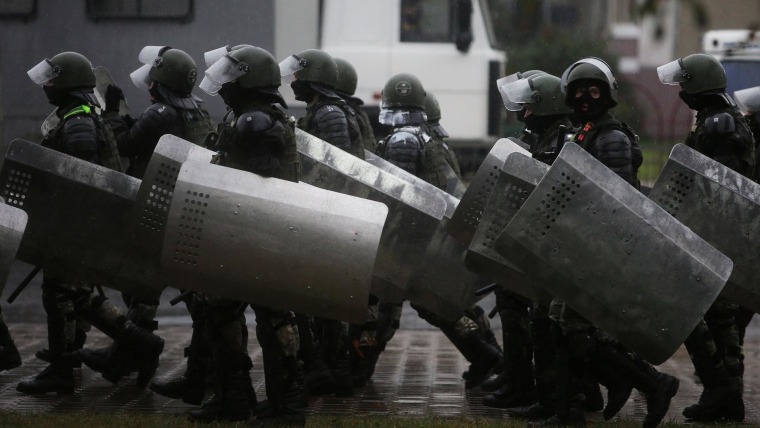WASHINGTON — The Trump administration has undercut democracy activists in Belarus and Hong Kong by abruptly ending funding to a U.S. internet freedom organization that provides technological tools to evade censorship and surveillance, according to cyber experts and lawmakers.
The organization, a nonprofit called the Open Technology Fund, said the sudden disappearance of $20 million has forced it to cancel plans to deliver emergency aid to journalists and civil society groups facing authoritarian clampdowns in Belarus and Hong Kong.
In Belarus, mass protests erupted after President Alexander Lukashenko said he had won re-election with 80 percent of the vote. When Lukashenko cracked down on protests and shut down more than 70 websites, pro-democracy activists and journalists sent urgent appeals by email for help from the Open Technology Fund, but the group had to turn them down because of the funding freeze, said Laura Cunningham, the fund’s president.
“It was just crushing to have to say we don’t have the resources to help you,” Cunningham said. “We weren’t able to provide the kind of additional support that we normally would be able to.”
The funding halt forced the Open Technology Fund to issue stop work orders for all of its projects in Belarus, where it has operated for years, said Karen Kornbluh, a former senior U.S. diplomat who is chair of the fund’s board.
The $20 million represented the bulk of the Open Technology Fund’s 2020 budget. The freeze was ordered by the new CEO of the U.S. Agency for Global Media, Michael Pack, a conservative documentary filmmaker and ally of Steve Bannon, the former adviser to President Donald Trump.
Pack, who took the helm in June, has angered both Republicans and Democrats in Congress by firing top executives and the governing boards of the Voice of America and other U.S.-funded media outlets overseen by his agency. Press freedom groups have warned that Pack is putting the editorial independence of the Voice of America and the other U.S. broadcasters at risk.
The Agency for Global Media declined to comment.
The Open Technology Fund, which develops open-source software and apps that allow users to get around digital censorship and to have secure communications, had also prepared to step up assistance and training for civil society groups in Hong Kong this year to coincide with China’s introduction of a draconian national security law for the region.
But the Trump administration pulled its funding just as China was poised to impose the national security law in Hong Kong, which expanded police surveillance powers and effectively outlawed political dissent.
“It was so critically important to be able to move quickly in that moment. And we were completely prevented from doing so,” Cunningham said.
Rep. Michael McCaul of Texas, the ranking Republican on the Foreign Affairs Committee, blasted the administration for suspending the funding for the Open Technology Fund, saying the suspension has undermined Trump’s stated policy goals and cut off “a lifeline” for people in Hong Kong, Iran and elsewhere.
“Shutting down OTF and its operations, especially at this critical time, has undercut our efforts to help those fighting for freedom and democracy around the globe,” McCaul said.
Although the Open Technology Fund enjoys strong bipartisan support in Congress and among internet freedom experts, religious freedom advocates allied with the Trump administration are at odds with the fund. They have demanded that the fund support anti-censorship software developed by Falun Gong, a banned religious group in China that supports Trump. The lobbying effort has focused in particular on an app called Ultrasurf, which Falun Gong allies say carries the potential to break down China’s “Great Firewall.”
The Open Technology Fund has declined to fund the software because, it says, Ultrasurf has declined to agree to a security audit. Ultrasurf is also a closed-source tool, meaning it is proprietary and available only to approved customers. The Open Technology Fund supports mainly open-source software, meaning freely available to the public, to ensure that there are no hidden “back doors” that governments could use to compromise security.
A spokesperson for Ultrasurf said that the company “has never declined a security audit” and that it underwent an audit carried out by the State Department.
Ultrasurf also says “open-source circumvention systems simply cannot survive targeted blocking efforts by powerful censors like China who dedicate billions of dollars and thousands of top talents” to the effort, the spokesperson said.
Cyber experts have expressed doubts about Ultrasurf’s claims about its software.
Pack and the Agency for Global Media are now locked in a legal battle with the Open Technology Fund over who controls the nonprofit and how it spends the money it receives from the government. Members of Congress have accused Pack of defying the will of Congress by blocking funding approved by lawmakers.
The Open Technology Fund has filed a lawsuit against the funding freeze in federal claims court, saying Pack’s agency has violated a grant agreement with the nonprofit. A ruling is expected later this month.
A Washington, D.C., court ruled Wednesday that Pack’s attempt to fire the fund’s leadership and to disband its board of directors was illegal and that his actions had violated the city’s laws governing nonprofits.
With a staff of only 10 people, the Open Technology Fund acts as an incubator of new software and technologies and links up researchers and developers with dissidents and activists trying to stay a step ahead of authoritarian censors. One of the open-source tools the group helped fund, Signal, has become a widely popular encrypted communication tool across the globe among journalists, civil society activists, diplomats and others looking for a secure way to communicate, in democracies as well as in authoritarian societies.
Rebecca MacKinnon, who directs the Ranking Digital Rights project at New America, a progressive Washington-based think tank, said the Open Technology Fund has built up an innovative community of researchers and software developers to help dissidents and civil society groups operating in perilous conditions.
“OTF has developed trust over the years with people who are quite vulnerable,” MacKinnon said. The funding freeze “is putting the lives of people all around the world at risk.”
Millions of Iranians use technology developed by the Open Technology Fund for secure communication, but the funding freeze means some of the tools are no longer available, according to the fund. It has tried to keep at least some communication tools operating in Iran, but the technologies are slower and less accessible, Cunningham said.
“We have basically used any resources that we have to keep them on life support, which means that fewer people can use the tools,” Cunningham said of the Iranian-language technologies.
Open Technology Fund tools also allow people in repressive countries to watch and listen to U.S.-funded broadcasters, including Radio Free Asia and Radio Free Europe, which are often blocked by regimes. About 85 percent of the audience for Iranian-language programming relies on the technology to evade censorship measures by Tehran, the nonprofit said.
The funding halt threatens to cut off the very audience that U.S. media organizations are trying to reach, Cunningham and lawmakers said.
The Open Technology Fund is the leading global funder for digital technologies designed to counter censorship and state surveillance, said Mallory Knodel, chief technology officer of the Center for Democracy and Technology, a nonprofit digital rights think tank.
“When you have $20 million disappear overnight for academic research, maintaining software, monitoring censorship … that just leaves a big gaping hole,” Knodel said.
A coalition of internet freedom groups is now appealing to other democratic governments to step up funding for anti-censorship tools, she said.

